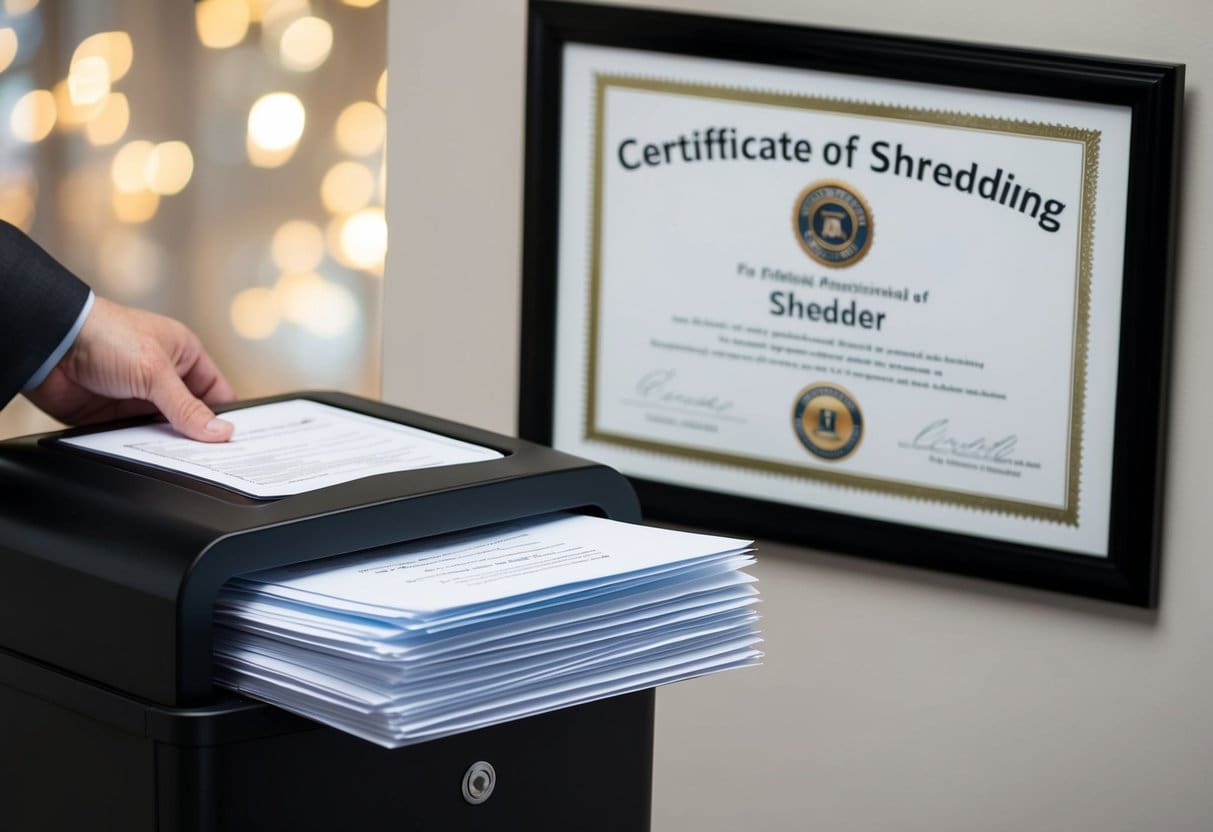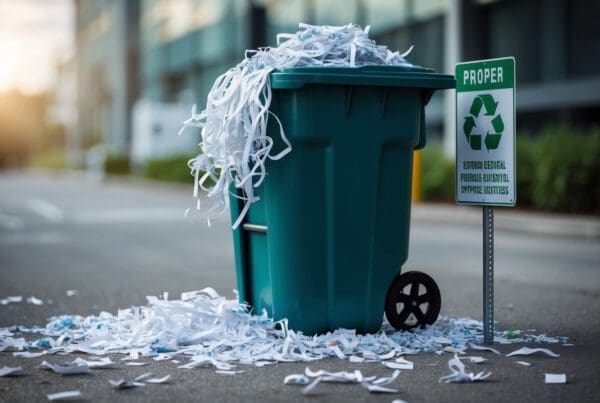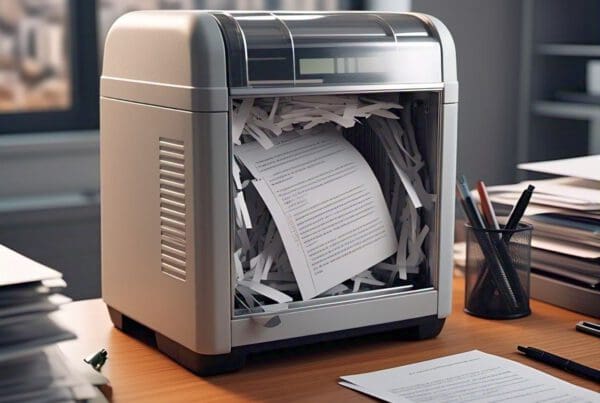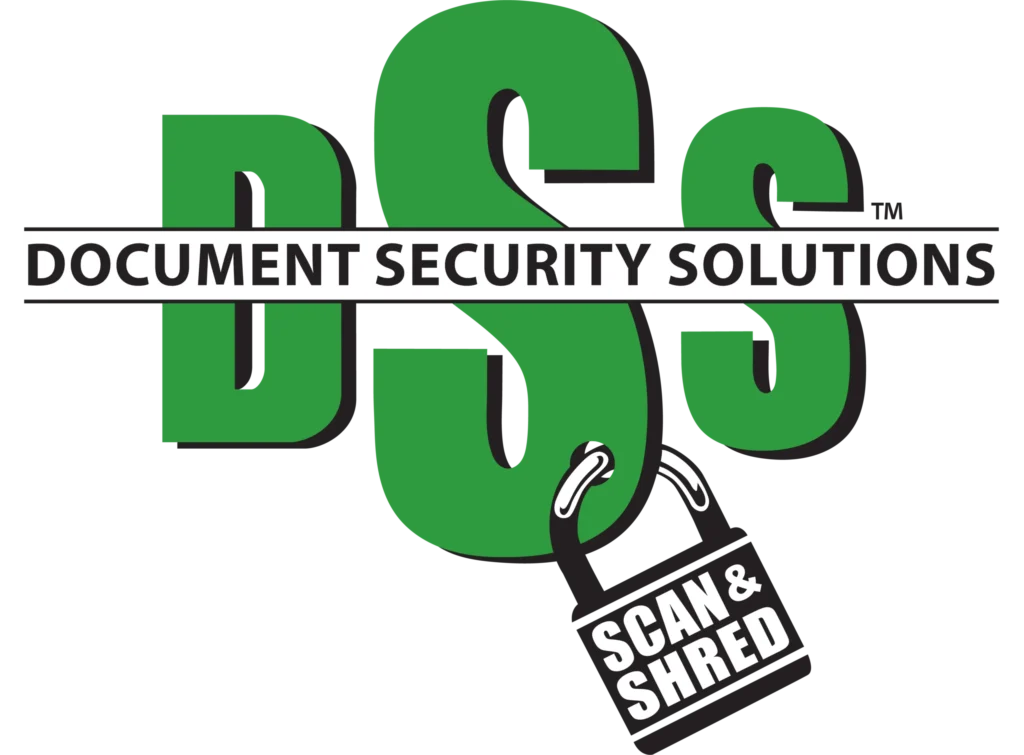Understanding Shredding Certification Relevance
As businesses in Georgia handle sensitive data, the importance of shredding certification becomes clear. Achieving certifications like NAID AAA and ISO 9001 not only ensures compliance but also strengthens our data security practices.
Foundational Aspects of Data Security
Data security is essential for protecting sensitive information from unauthorized access. When we use certified shredding services, we can be confident that our documents are destroyed in a way that minimizes risk. Certifications like NAID AAA ensure strict security protocols are followed.
We must consider the value of these certifications in building trust with our clients. By choosing providers with recognized credentials, we demonstrate our commitment to safeguarding information and maintaining high-security standards.
Necessity of Compliance with Regulations
In Georgia, compliance with data protection regulations is non-negotiable. Businesses handling personal or sensitive data need to meet legal standards to avoid penalties. Shredding certifications help us ensure compliance by verifying that we are following comprehensive guidelines.
Certified services use approved methods to securely handle and destroy information. This makes it easier for us to adhere to laws and protect our business from legal risks and liabilities. Thus, certifications play a crucial role in our efforts to maintain a secure and compliant environment.
Certifications’ Role in Information Security
Certifications like NAID AAA and ISO 9001 are key to reinforcing our information security framework. They require us to follow rigorous procedures for handling and destroying data. By integrating these certifications into our practices, we strengthen our overall security posture.
These certifications demand continuous improvement and monitoring. This ensures that our data protection methods evolve with emerging threats. Working with certified shredding providers enhances our ability to safeguard confidential information, reflecting our commitment to data security.
Implementing Certified Shredding Services
Implementing certified shredding services ensures that sensitive documents are destroyed securely. Choosing the right company and deciding between on-site and off-site shredding are crucial steps. Finally, confirming documents are fully destroyed provides peace of mind.
Choosing the Right Shredding Company
To choose the right shredding company, we first verify their certifications. Look for NAID (National Association for Information Destruction) certification. This ensures the highest standards.
Next, we should examine their reputation. Online reviews and testimonials from other businesses in Georgia can give insight. Talking with their representatives also helps understand their processes.
It’s important to ask about their security measures. We should inquire whether employees undergo background checks. This confirms that only trusted individuals handle our documents.
Finally, pricing needs to be clear. We compare prices among different companies. Some might offer discounts for long-term contracts. Understanding their pricing structure helps us make an informed decision.
Benefits of On-Site vs. Off-Site Shredding
When considering shredding options, location matters. On-site shredding involves a mobile shredding truck coming to us. We can witness our documents being destroyed immediately. This offers a high level of security.
Off-site shredding means documents are taken to a facility. It can be more cost-effective due to the centralized shredding process. However, it requires trusting the transport process.
Both methods have controls in place to prevent data breaches. On-site shredding makes it easier to oversee the process. Off-site shredding often uses secure transport containers.
Our choice depends on our needs. If instant shredding is crucial, on-site may be better. For larger volumes and cost considerations, off-site might suit us.
Ensuring End-to-End Document Destruction
Ensuring end-to-end document destruction is vital. We start by securing our documents before shredding. Lockable bins and strict access guide this step.
During shredding, maintaining a chain of custody is key. We track who accesses and handles our documents. This ensures accountability at every stage of the destruction process.
We also check for certifications that guarantee destruction standards. The shredding company should provide a Certificate of Destruction. This official document confirms that shredding was completed successfully.
After shredding, we consider recycling. Most shredded paper can be recycled. It’s an eco-friendly step that many companies, including ours, embrace. This not only secures our data but also benefits the environment.
Preventing Information Breaches
We emphasize the critical role of shredding certification in protecting businesses from data breaches. This ensures sensitive information remains secure, preventing potential identity theft and financial losses.
Consequences of Data Breaches on Businesses
Data breaches can have severe impacts on businesses. Our reputation is at risk, and trust can be lost if sensitive information is exposed. Financial losses can mount due to fines, legal fees, and loss of customers.
Moreover, the cost of addressing a breach often includes technical investigations and system improvements. Breaches may also lead to regulatory penalties, especially in industries handling sensitive data such as healthcare or finance. Businesses must prioritize data security to avoid these damaging outcomes.
Importance of Certificate of Destruction
A Certificate of Destruction provides proof that documents and information are securely destroyed. This not only helps us meet legal requirements but also reassures clients and stakeholders.
The certificate typically details when, where, and how our documents were destroyed, offering transparency and accountability. By maintaining such records, we demonstrate commitment to safeguarding information. Enlisting certified shredding services strengthens trust and provides an extra layer of security for our business.
Safeguarding Against Identity Theft
Combatting identity theft begins with protecting sensitive data. We must ensure that personal and business information is disposed of properly through certified shredding. This reduces the risk of identity theft by preventing unauthorized access to discarded documents.
Implementing procedures to keep sensitive information secure is essential. These measures, coupled with regular employee training, enhance data protection efforts. Our focus on effective information disposal helps protect both our businesses and clients from identity theft, supporting a secure environment.
Adhering to Georgia’s Legal Framework
To ensure compliance with legal requirements, businesses in Georgia must pay attention to several key laws and regulations. These laws include HIPAA, FACTA, and GLBA, which set strict standards for information security and privacy. Companies face state-specific audits and compliance checks to ensure adherence.
Regulatory Overview: HIPAA, FACTA, and GLBA
HIPAA affects businesses handling health information. It requires us to protect patient data through secure disposal methods like shredding. Non-compliance leads to fines and penalties.
FACTA targets businesses dealing with consumer credit data. We must responsibly destroy information to prevent identity theft, using proper shredding techniques.
GLBA requires financial institutions to protect customer data. It mandates us to have measures like shredding in place for information protection and disposal.
Implications for Businesses in Georgia
Understanding Georgia’s regulations is crucial. By adhering to laws like HIPAA, FACTA, and GLBA, we not only comply but gain trust from clients.
Legal violations can result in hefty fines or even legal battles. Therefore, developing a certified shredding process becomes a practical, protective measure.
Many sectors, including healthcare and finance, must follow specific guidelines. Businesses falling under the influence of these laws should be particularly vigilant.
State Compliance and Audits
Georgia conducts audits to ensure businesses meet these standards. Regular checks may happen to verify shredding certifications and processes.
Preparing for these audits involves maintaining detailed records and documentation of our shredding practices.
Continuous training and updates on regulations help us remain prepared. Collaborating with certified shredding partners can add an extra layer of compliance assurance.
By staying proactive, we mitigate risks and bolster our standing both legally and reputationally.
Elevating Business Practices through Certification
In Georgia, shredding certification enhances business operations by ensuring high security standards. It also strengthens customer trust and promotes continuous improvement.
The AAA Certification Standard
The AAA Certification Standard is a well-recognized mark in data destruction. Established by the National Association for Information Destruction (NAID), it ensures businesses meet strict guidelines. This standard is crucial for companies dealing with sensitive information.
Our company must document procedures and undergo audits to achieve this certification. Through AAA Certification, we can guarantee secure data-handling processes.
It’s important to understand that obtaining AAA Certification not only improves security but also reflects our commitment to best practices. We demonstrate to clients that their information is handled with maximum care and confidentiality.
Enhancing Customer Trust and Satisfaction
Certification has a big impact on customer trust. When potential clients see that we hold an NAID AAA Certification, it reassures them. They know their information is in safe hands. Trust is vital when dealing with confidential documents.
Moreover, certification can lead to improved customer satisfaction. As part of our certified practices, we consistently provide high-quality service. Standards are maintained, errors are minimized, and customer concerns are addressed efficiently.
By prioritizing certified practices, we foster strong relationships with clients. This approach builds a reliable reputation in the market.
Continuous Improvement and Certification
Obtaining certification is not a one-time event. It requires consistent effort and commitment to excellence. Through certification, our business is encouraged to engage in continuous improvement.
Regular audits and updates keep us aligned with industry standards. The process fosters innovation and adaptation in our operations. We need to stay up-to-date with technological changes and security threats.
Focusing on continuous improvement helps us address challenges effectively. This mindset ensures our standards remain high, and client expectations are regularly met. Our dedication to improvement supports long-term growth and stability in the dynamic business environment.





